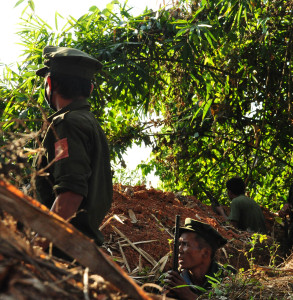Offensives by the Burmese army in Kachin State are undermining the peace process, according to an ethnic women’s organization known as the Kachin Women’s Association Thailand (KWAT).
 In a statement released today, KWAT expressed concern over the recent escalation in Burmese army attacks in Kachin and Shan States, which it says has led to “fresh displacement and suffering” of local civilians.
In a statement released today, KWAT expressed concern over the recent escalation in Burmese army attacks in Kachin and Shan States, which it says has led to “fresh displacement and suffering” of local civilians.
The statement further warned that “These systematic operations to seize control of key trade routes and economic zones along the China-Burma border throw strong doubt on the government’s sincerity towards the peace process.”
In an interview with Karen News, , KWAT Joint General Secretary Jessica Nhkum said that abuses committed by Burma’s army are threatening the country’s peace talks: “We cannot be confident in the peace talks while the army is still attacking our Kachin people and perpetrating human rights abuses,” she said.
The Kachin State conflict—which first erupted in June 2011 after a Burmese army offensive against the Kachin Independence Organization (KIO) led to the collapse of a 17-year ceasefire—has already displaced over 100,000 civilians in Kachin State and neighboring Shan State. During the conflict, Burma’s army has used helicopter gunships, heavy artillery, and jet fighters.
In its statement, KWAT’s alleges that Burma’s army used the national census as a pretext to launch a large-scale offensive in April on Mansi Township, a strategic border-crossing which straddles China and Burma.
“1,500 Burmese troops were sent into the area before the attacks on the pretext of providing security for the census, but instead they launched an unprovoked attack against the Kachin Independence Army on April 10th. [During the attack,] heavy shelling of Lagat Yang IDP camp and nearby villages caused over 3,000 people to flee. The Burmese army has now seized the Bang Kham border post and has established control over this area,” the KWAT statement said.
Currently, Burma’s Army is engaged in an offensive in northern Shan State at a place called Mong Baw. Most likely, their purpose is to wrest control of the strategically important Lashio-Muse highway, a vital trade artery. The KWAT statement said that in late April, over 1,000 Burma Army troops were deployed to Mong Baw, and on May 3rd mortar shells were fired into nearby villages, causing “about 1,000 villagers to flee their homes.” During the May 3rd operation, Burmese army jet fighters were used, according to KWAT.
KWAT’s statement also alleges that Burma’s army has been committing various human rights abuses in conflict zones, including sexual violence and torture. For instance, KWAT documented a case in which a 17 year-old schoolgirl was gang-raped on April 10 by Burmese army soldiers from “Light Infantry Battalion 320” in Mansi Township.
KWAT said it has documented sexual violence against 70 women and young girls by the Burmese army in the past three years, half of whom were eventually killed. KWAT vehemently condemned these abuses, saying that “We deplore these continuing incidents of rape, and urge that the issue of military sexual violence be addressed as a matter of priority during peace negotiations [between Burma’s government and ethnic groups].”
KWAT’s Jessica Nhkum maintained that foreign governments are obligated to invest in Burma responsibly and told Karen News that Burma’s ongoing conflicts and land-grabbing should be taken into consideration by potential investors.
“In terms of the international community, every foreign government has their own interests, [but] they should stop investing [in projects with] Burma’s government while there is still civil war and innocent people in Kachin State are suffering,” Ms. Nhkum said. She added that foreign governments don’t want to hear about these kinds of problems happening in Burma, but rather focus on the country’s potential economic opportunities.
KWAT’s statement coincides with a report released today by human rights watchdog Fortify Rights, which said it has documented dozens of cases of torture perpetrated by Burma’s army—acts which the NOG says amount to “war crimes” and “crimes against humanity.”
The Fortify Rights report concluded that the use of torture by Burma’s army has been systemic and has had the support of President Thein Sein’s government. The report asserted that “The similarities in incidents of torture documented in disparate locations during a three-year period indicate that torture was carried out as part of a widespread and systematic attack against the civilian population with the backing of the state. Civilians were systematically tortured in rural villages, areas of armed conflict, government facilities, and places of detention.”



